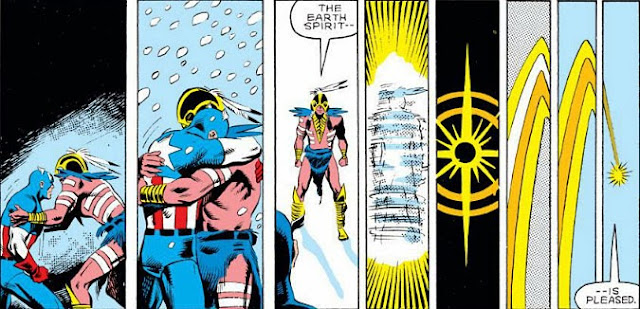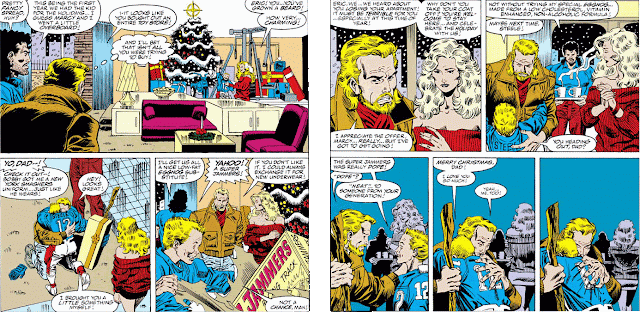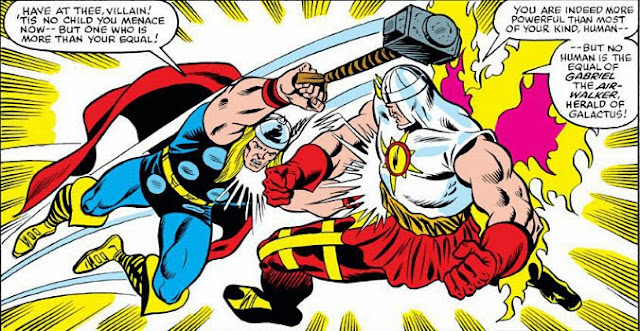"Maybe Christmas," he thought, "doesn't come from a store.""Maybe Christmas...perhaps...means a little bit more!"![]()
Christmas is certainly a time of year when Eric Masterson--who took a turn as the mighty Thor when the real Thor was banished by the Asgardians (for, apparently, killing his half-brother, Loki)--could use some of the joy and optimism that spreads around during the holidays. Eric hadn't been having an easy time of it lately. He was evicted from his apartment by the building's tenants committee, who had quite enough of attacks by super-powered intruders. His architect business was suffering. He'd had to cede custody of his son, Kevin, to his ex-wife in order to better ensure his safety while Eric continued as Thor. His executive assistant, Susan Austin (who also has feelings for Eric), was in a coma thanks to an attack by Loki. And he was on shaky ground with the Avengers--particularly Captain America, who knew his situation regarding Thor and who was worried that Eric may not work out as an Avenger.
In the interest of full disclosure, I should probably admit right off the bat that, while I like Eric Masterson quite a lot as a character, I've never really cared for him as Thor. And I think I can sum up why by posing a simple question: When you think of the God of Thunder, do you picture Eric Masterson or anyone else
as the God of Thunder? I'm willing to bet that no one else even comes to mind, not even Beta Ray Bill. Eric and Thor are two separate entities, in every sense. Thor is more than just a hero with a cape and a hammer--more than just an Avenger. Even Cap, who has proven worthy to lift Mjolnir and who has his own fighting spirit, couldn't stand in for Thor or fill his shoes in battle and elicit the same sense of excitement and thrill for readers as the Thunder God. Captain America, I think we'll all agree, isn't a thunder god, nor, by extension,
the Thunder God--and if that's so, then it's equally true for Eric.
In Eric, we see how an average mortal would handle being Thor, perhaps just as Donald Blake might have turned out if he hadn't taken his relationships with Odin or Asgard at face value. And this issue's conflict might serve to call into question how Eric chooses to operate as Thor, and why Cap might be justified in checking up on him. Yet I enjoy this story because it focuses instead on
Eric's life and perspective, and how even he seems to acknowledge that he's not and never will be Thor--he just wants to do his best with the responsibility he's been given. It's a heavy weight on his shoulders, in many ways.
To start things off, Eric scoring a racing track setup for Kevin on Christmas Eve reminds us that 'tis the season for shopping. But he's about to discover that someone--some
thing--has declared open season on shoppers, or, rather, what they've shopped
for:And so, welcome to a tale where Frank Capra meets Dr. Seuss:
Naturally, Eric takes off after the thief, though he's already preoccupied with his role as an Avenger:
Even changing to Thor and conducting an aerial sweep of the area produces no sign of the perp, and so Eric chalks it up as a loss. Still, I must ask: When was the last time you saw someone using a walking stick take off running after someone, showing no sign of any injury to their leg(s)?
Unfortunately, Eric's next stop isn't likely to lift his spirits, since it's at the home of his ex-wife and her new husband, who can obviously provide Kevin with the kind of Christmas that's beyond Eric's means:
This scene worked so well for me, further putting me in the camp of Team Eric as a character. Ideally, we could still have Eric's union with Thor as it once was--Eric as his mortal identity, with the true Thor being the character he switched to, the best of both worlds. On the other hand, I'm still intrigued by Eric
as Thor--it feels as if I'm pulling for him as he grapples with the kind of life he's trying to balance. And when he resumes his search for the Christmas street thief, it feels good to see him have something to take his mind off the separation from his son:
Now that he has the thief in clear sight, Eric believes he'll have no difficulty in wrapping up this case in his identity as Thor. But when he's brought down unexpectedly by a beam which weakens him, he gets his first wide-eyed look at the mysterious gift-grabber:
The "Groonk," however, chooses another tactic to shake his foe:
Finally, though, when the Groonk puts down Eric (See what I mean? It never occurs to me to refer to him as "Thor"), at least for the present, he's urged to abandon the battle by, of all things:
But Eric has taken far too many lumps tonight to let it go at that, and he brings his baggage directly to the Groonk's doorstep for a final exchange of blows:
Once the threat of the Groonk is dealt with, though, Eric is attacked again, but this time by ordinary people who have camped in the underground tunnels and have, surprisingly, befriended the Groonk. And, again, I find myself pulling for Eric, who discovers that not every battle should be resolved with breast-beating and fists:
It's here that this tale pivots, and Eric discovers circumstances that help him to climb out of the downward spiral he felt himself trapped in. And with his next stop--at the hospital where Susan is being attended to--he gets some unexpected help:
As you can imagine just from the visuals here, Susan's recovery helps to begin the process of slowly lifting the weight on his shoulders that Eric has felt on this day before Christmas. And his next encounter, this time with Cap, perhaps doesn't alleviate his concern about measuring up in the Avengers, but is more like a wake-up call of constructive criticism:
By far, though, what he finds waiting for him at his old apartment is what makes this Christmas the one he may remember the most:
![]()
![]()
![]()
This being a Christmas issue perhaps gave the book the excuse to shift the limelight away from its selling point, Thor, and instead focus on being an Eric Masterson story and giving readers a chance to become more sympathetic to him. And we seemed to cover all the bases in that regard, by cramming in most of his supporting characters: His son, of course, along with Eric's ex-wife, Marcy; Jerry Sapristi, a construction foreman and friend of both Eric and "Sigurd Jarlson," Thor's "mortal" disguise; Jackie Lukus, who's interested in Eric; the Avengers (in the form of Cap); Hercules, in his mortal appearance as Harry Cleese (heh, get it?); as well as Susan Austin. Yet the issue also managed to give us a generous helping of Eric as Thor, which fit in with introducing the character everything orbited around, the Groonk--who, instead of stealing Christmas, might have actually helped to give it to one person who really needed it.
























































































































































































































